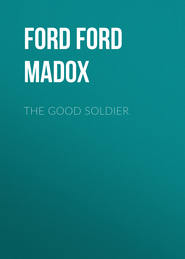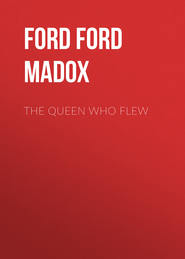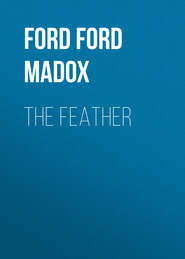По всем вопросам обращайтесь на: info@litportal.ru
(©) 2003-2024.
✖
Privy Seal: His Last Venture
Настройки чтения
Размер шрифта
Высота строк
Поля
'Dearie,' she said, 'dandling piece, sweet bit, there are no true men.' She had an entreaty in her tone, and her large blue eyes gazed fixedly. 'Say that my cousin Anne was a heretic. I know naught of it save that my bones have ached always since the holy blood of Hailes was done away with that was wont to cure me. But the Queen Anne was hard driven because of a plotting; and no man stood her friend.' With her large and tear-filled eyes she gazed at the palace, where the pear trees upon the walls shewed new, pale leaves in the sunlight. 'The great Cardinal was hard driven because of a plot, and no man was true to him. There is no true man. Hope not for one. Hope not for any one. The great Cardinal builded those walls and that palace – and where is he?'
'Yet,' Katharine said, 'Privy Seal that is was true to him and profited exceedingly.'
Lady Rochford shook her head.
'For a little while truth may help you,' she said; 'but your name in the end shall be but a stink.'
'Ay,' Katharine answered her; 'but ye shall gain at the end of all. For I hold it for certain that because, to the uttermost dregs of his cup, Cromwell was true to his master Wolsey, before the throne of God much shall be pardoned him.'
The old woman answered bitterly:
'The throne of God is a long way from here.'
'Please it Mary and the saints,' Katharine said, 'the ten years to come shall bring Heaven a thousand leagues nearer to this land.' But her words died away because the Lady Rochford's mouth fell open.
From the terrace a great square man led down a tiny, small man, giving the child his finger to help him down the steps. It clung to him, the little, squared replica of himself, sturdily and with a blonde, small face laughing up into his father's that laughed down past a huge shoulder. Henry was dressed all in black, and his son too; the boy's callow head shone in the sunshine, and they came dallying down the little path, many faces and shoulders peering over the terrace wall at them. Once the child stumbled, loosed his hold of his father's finger and came down upon all fours. He crawled to the pathside, filled his little hands with leaves, and held them up towards his sire; and they could hear the King say:
'Who-hoop, Ned! Princes walk not like quadrumanes,' as he bent to take the leaves. The child twisted himself, gripping his little fingers into Henry's garter, and, catching again at his finger, pulled his father towards their bower.
The Lady Rochford rose, but Katharine sat where she was to smile upon the child and brush his head with a pink tassel of her sleeve. The little prince hid his face in the voluminous velvet of his father's vast thighs. The King, diffusing a great and embracing pride, laughed to Lady Rochford.
'Ye played cat's-cradle,' he said. 'I warrant ye brought it not beyond seven changes. Time was when I have done fourteen with a lady if her hands were white enough.'
He threw away the green leaves of the clove pinks that his son had given him, and took the blue and silver loop from the old woman's hands. He sat himself heavily on the bench facing Katharine, and crying, 'See you, silly Ned,' held his son's hands apart and fitted the cord over the little wrists.
Suddenly he bent clumsily forward and picked up again the carnation leaves that lay in green strands upon the floor of the arbour, grunting a little with the effort.
'This is the first offering my son ever made me,' he said, and he drew a pocket purse from his breast to lay them in. 'Please God he shall yet lay at my feet a province or two of our heritage of France.' He touched his cap at the Deity's name, and called gruffly at his son: 'See you, forget not ever that we be Kings of France too, you and I,' and the little boy with his cropped head uttered:
'Rex Angliae, Galliae, Franciae et Hiberniae!'
'Aye, I ha' learned ye that,' the King said, and roared with laughter. Of a sudden he turned his head, without moving his body, towards Katharine.
'I ha' news from Norfolk in France,' he said, and, as the Lady Rochford made to move, he uttered good-naturedly: 'Aye, avoid. But ye may buss my son.'
He stretched back his head, laid an arm along the back of his seat, put out his feet and pushed at the child, who played with his shoe-tags.
'The boy grows,' he said, and motioned for Katharine to sit beside him. Then his face shewed a quick dissatisfaction. 'A brave boy, but a should be braver,' and looking down, 'see you not blue lines about 's gills?' He caught at her hand with a masterful grip.
'Here we're a picture,' he said: 'a lusty husbandman, his lusty son, his lusty wife, resting all beneath his goodly vine.' His face clouded again. 'I – I am not lusty; my son, he is not lusty.' He touched her cheek. 'Thou art lusty enow – hast such pink cheeks.'
'Aye, we were always lusty at home when we had enow to eat,' Katharine said. She took the child upon her knee and blew lightly in his face. 'I will wager you I will guess his weight within a pound,' she added, and began to play a game with the tiny fingers. 'Wherefore do ye habit little children in black?'
'Why,' the King answered, 'I know not if I myself appear less monstrous in black or red, and my son shall be habited as I be. 'Tis to make the trial.'
'Aye,' Katharine said, 'ye think first of yourself. But dress the child in white and go in white yourself. And set up a chantry of priests to pray the child grow sturdy. It was thus my cousin Surrey's life was saved that was erst a weakling.'
'Be Queen,' he said suddenly. 'Marry me. I came here to ask it.'
Her lips parted; she left her hand in his. The expected words had come.
'I have thought on it,' she said. 'I knew ye could not long hold to child and sire as ye sware ye would.'
'Kat,' he said, 'ye shall do my will. I ha' news from France. Ye gave me good rede. I ha' news from Cleves: the Cleves woman shall no more be queen of mine. Thee I will have.'
She raised herself from the bench and turned in the entrance of the arbour to look at him.
'Give me leave to walk on the path,' she said. 'I have thought on this – for I was sure I gave you good advice, and well I knew Cleves would sever from ye.' She faltered: 'I ha' thought on it. But 'tis different to think on it and to ha' the thing in your face.'
He uttered, 'Make haste,' and she walked down the path. He saw her, tall, fair, swaying a little in the wind, raise her face to the skies; her long fingers made the sign of the cross, her hood fell back. Her lips moved; the fringes of her lashes came down over her blue eyes, and she seemed to wrestle with her hands.
'Aye,' he muttered to himself half earnest, half sardonic, 'prayer is better than thoughts. God strike with palsy them that made me afraid to pray… Aye, pray on, pray on,' he said again. 'But by God and His wounds! ye shall be my queen.'
By the time she came back he laughed at her tempestuously, and pushing the little prince tenderly with his huge foot, watched him roll on the floor catching at the air.
'Why,' he said to her, 'what's the whimsy now? Shalt be the queen. 'Tis the sole way. 'Tis the way to the light.' He leant forward. 'Cleves has gone to the bastard called Charles to sue for mercy. Ye led me so well to set Francis against Charles that I may snap my fingers against both. None but thee could ha' forged that bolt. Child, I will make a league with the Pope against Charles or Francis, with Francis or Charles. Anne may go hang herself.' He rose to his feet and stretched out both his hands, his eyes glowing beneath his deep brows. 'Body o' God! thou art a very fair woman; and now I will be such a king as never was, and take France for mine own and set up Holy Church again, and say good prayers and sleep in a warm bed. Body o' God! Body o' God!'
'God and the saints save the issue!' she said. 'I am thy servant and slave.'
But her tone made him recoil.
'What whimsy's here?' he muttered heavily, and his eyes became suffused with red. 'Speak, wench!' He pulled at the stuff round his throat. 'I will have peace,' he said. 'I will at last have peace.'
'God send you have it,' she said, and trembled a little, half in fear, half in sheer pity at the thought of thwarting him.
'Speak thy fool whimsy,' he muttered huskily. 'Speak!'
'My lord,' she said, 'where is the Queen that is?'
He flared suddenly at her as if she had reproved him.
'At Windsor. 'Tis a better palace than this of mine here.' He shook his finger heavily and uttered with a boastful defiance: 'Shalt not say I shower no gifts on her. Shalt not say she has no state. I ha' sent her seven jennets this day. I shall go bring her golden apples on the morrow. Scents she has had o' me; French gowns, Southern fruits. No man nor wench shall say I be not princely – ' His boasting bluster died away before her silence. To please a mute desire in her, he had showered more gifts on Anne of Cleves than on any other woman he had ever seen; and thinking that she used him ill not to praise him for this, he could not hold his tongue: 'What is't to thee what she hath? What she hath thou losest. 'Tis a folly.'
'My lord,' she said, 'I will myself to see the Queen that is.'
'And whysomever?' he voiced his astonishment.
'My lord,' she said, 'I have a tickly conscience in divorces. I will ask her mine own self.'
He roared out suddenly indistinguishable words, stamped his feet, waved his hands at the skies, and lost his voice altogether.
'Aye,' she said, catching at some of his speech, 'I ha' read your Highness' depositions. I ha' read depositions of the Archbishop's. But I will be satisfied of her own mouth that she be not your wife.'
And when he swore that Anne would lie:
'Nay,' she answered; 'if she will lie to keep her queenship, keep it she shall. I am upon the point of honour.'
'Before God!' – and his voice had a sneering haughtiness – 'ye will not be long of this world if ye steer by the point of honour.'












